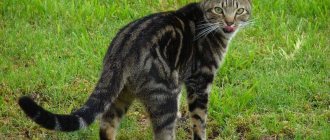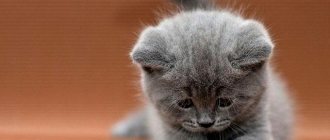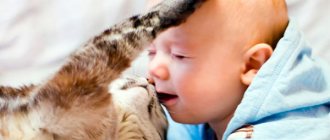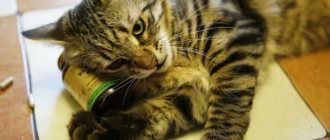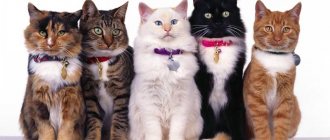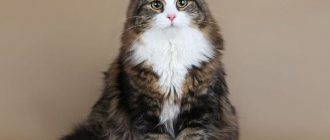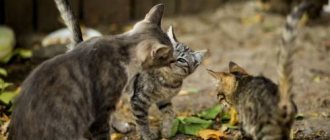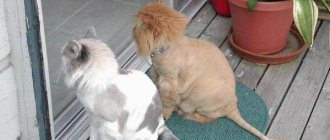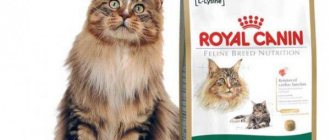Author Anastasia Rogova
09/10/2018 08:20 (Updated: 06/06/2021 17:29)
Zoosphere » Interesting
It is traditionally believed that cats are the best mouse hunters. But, as practice shows, this title is not entirely deserved. It turns out that in addition to cats, there are several pets that can easily lay claim to the title of champion mouser.
What breed of cat catches mice and rats?
The fame of outbred cats as the terror of rats and mice is well founded. After all, for them hunting is not just entertainment, but a way of survival. Healthy genes, not spoiled by close ties, ensure not only the transmission of hunting talent, but also physical endurance - a mandatory guarantee of victory over the enemy.
If we talk about purebred animals, then when discussing which breeds of cats catch mice, first of all we need to talk about the so-called aboriginal breeds. They naturally formed in a particular territory without the intervention of breeders, that is, they were bred by nature itself with all the ensuing advantages.
Among the “Russians” these are Siberian cats, Russian Blues, and Kuril Bobtails. Of those that have foreign roots, it is worth noting the giants Maine Coons, Orientals, Bengals, Abyssinians, Ocicats, Thais and Siamese, Chartreux, European and British Shorthairs - these cat breeds are also very, very deft at catching mice.
We recommend viewing
All about Sphynx cats How much do Maine Coon cats cost? Are they worth the money? All about Maine Coon cats
When she is ready, the cat will complete the kill. The mouse can be decapitated by its claws or chewed by its teeth. A cat thirsty for blood may bite off the head of a mouse.
This type of pursuit exhausts cats, requiring a lot of movement and energy. As a result, some cats choose a more passive approach. They find out where the mice are hiding and lie low and wait. If a mouse comes out of its hole, the cat immediately attacks.
How many mice do cats kill per year?
There is no exact answer to this question. This depends on a number of factors, including:
- temperament and cat breed . Not all cats like to hunt mice
- Population of mice in the area . More mice means more hunting opportunities
- Hunger . Feral cats kill more than domestic cats because they cannot rely on humans for food
- Age . As cats age, they have difficulty coping with the physical demands of hunting.
According to the journal Nature Communications, domestic cats that roam outdoors kill up to 22 billion mammals every year. It's not just mice. Some cats hunt larger prey, including shrews, rats, and even rabbits or squirrels.
How many mice do cats eat per day?
Again, this figure is not constant. Typically, a domestic cat will not eat mice. Some owners find this a relief. Eating mice can make cats sick, as small animals carry diseases.
Feral cats are more likely to eat mice for food and protein. If a cat eats only mice, it will need to eat on average about eight mice per day to feed itself. A cat needs 240 calories a day to live, and one mouse provides about 30 of them.
However, only the most energetic and energetic cat would have the energy to hunt eight mice a day. Most cats supplement their diet with other, slower prey.
Why do cats catch mice and not eat them?
As already mentioned, cats hunt to satisfy their natural urges and drives. Just because your cat catches a mouse doesn't mean she will eat it. A well-fed domestic cat rarely eats its prey.
On the contrary, such a cat often leaves the corpse of a mouse where it has finished killing. Alternatively, the cat may take the corpse back to its usual territory as a trophy or present it as a gift to its owner.
This is one of the least attractive elements of ownership. Resist the urge to react with disgust. Your cat expects you to praise her hunting prowess. She may even give you a mouse because she's worried that you won't be able to hunt and feed yourself.
How not to harm a cat during castration?
In order for your pet to remain “full” even after castration, you must follow some rules when performing it.
Thus, all experienced veterinarians believe that castration of animals from seven years of age and older is permissible only in case of chronic and cancerous diseases of the reproductive organs. The problem is that when such pets are sterilized, there is a serious hormonal imbalance. This will not improve your pet's health. He may begin to have problems with excess weight, the cat will become apathetic, lethargic, and he will even stop catching mice. To prevent this from happening, it is advisable to sterilize older pets using medication. In this case, the level of hormones will decrease gradually, the animal’s body will have time to adapt to the changes taking place, and therefore serious consequences will be avoided.
It's easiest with kittens. They quickly recover from the operation, and hormones do not have such an effect on them (since they have not yet begun to be produced in the proper volume). It is for this reason that it is recommended to castrate animals at an early age. In this case, the procedure does not change their behavior in any way, and the cat will continue to hunt mice with the same enthusiasm.
Tailed liberators of Leningrad
When all the cats in the besieged city were eaten in 1943, rats began to multiply at a catastrophic rate. They ran through the streets like a businessman in search of corpses, climbed into apartments, destroyed furniture and the last supplies.
The rodents were shot by special brigades and crushed by tanks, but the “rat troops” did not retreat. The city was saved by rat-catching cats of Russian and Siberian breeds. They were brought in trains from all over the country after the blockade was broken.
Today, two sculptures remind us of the four-legged liberators. One depicts the cat Vasilisa standing on the ledge, the second depicts the cat Elisha sitting opposite. St. Petersburg residents believe that whoever throws a coin on a cat pedestal will be lucky.
Recommendations
A hunting cat spends a lot of time outdoors, in contact with other animals, which increases the likelihood of infection and the development of diseases. To protect your pet from diseases, you need to remember the following rules:
- the cat must be periodically vaccinated against potential diseases;
- the pet needs to be fully fed and fortified with vitamin supplements, which will strengthen the immune system;
- every 5 months, clean your pet of worms for the purpose of prevention;
- the animal needs to buy a flea collar that prevents the spread of parasites;
- in early spring, before a walk, it is recommended to treat your pet’s fur with protective sprays, since in May the likelihood of insect attacks increases.
For preventative purposes, you can take your cat to the veterinarian for examination once every six months.
Sources
- https://animalsinfo.ru/%D0%BA%D0%BE%D1%88%D0%BA%D0%B0-%D0%B5%D1%81%D1%82-%D0%BC%D1%8B %D1%88%D0%B5%D0%B9-%D0%B2%D1%80%D0%B5%D0%B4%D0%BD%D0%BE-%D0%B8%D0%BB%D0%B8 -%D0%BF%D0%BE%D0%BB%D0%B5%D0%B7%D0%BD%D0%BE/
- https://xklop.ru/myshi-i-krysy/kakaya-poroda-koshek-luchshe-vsego-lovit-myshej.html
- https://apest.ru/myshi/vse-o-myshah/edyat-li-myshej-koshki/
- https://VashiKoshki.ru/porody/krysolov
- https://gafki.ru/koshki/krysolovy.html
- https://aquatech-spb.ru/koshki-porody/lovyat-li-koty-myshej.html
- https://www.zaggo.ru/article/vokrug_doma/obshee4/kak_izbavit_sya_ot_myshej_i_krys_8_porod_koshek_krysolovov_kotorye_najdut_i_obezvredyat_gryzunov.html
How does castration affect the hunting instinct?
Owners of apartments in urban high-rise buildings are not particularly concerned about the loss of hunting skills in their cat after sterilization. But for owners of private houses this topic is extremely relevant. How does the castration or sterilization procedure affect an animal’s ability to kill rodents?
The decision to neuter a cat will not greatly affect its hunting instincts. Cats before and after castration exterminate rats and mice in the territory entrusted to them with equal eagerness and skill. The exception is castrati who are overweight, which appears due to a sedentary lifestyle and too high-calorie diet. It is difficult for such pets to move, and their hunting skills are gradually reduced to zero.
Since the ability to hunt in cats is inherent at the level of instinct, it is difficult to influence it by sterilization. After the procedure, the animal may become less active and mobile, go out hunting less often, but this will not make the ability to track and catch a mouse disappear.
While cats often become fat and lazy after castration, spayed females, on the contrary, show more interest in hunting. Many cat owners claim that after their pet has become infertile, it goes hunting more often and brings its owners the trophies it catches. In addition, having lost interest in the opposite sex and not spending time and energy on bearing and feeding offspring, the cat directs all its energy to satisfying the hunting instinct.
In general, a tendency towards hunting and active games can be identified in an animal even in childhood. If, as a kitten, the pet is not distinguished by curiosity, nimbleness and activity, it is unlikely that in adulthood, especially after castration, it will be drawn to adventures. Typically, castrated cats become more obedient, calm and balanced.
Hunting instinct in cats
As for the question of who is better at catching mice - a cat or a cat, the latter are considered more courageous rat catchers. A dexterous female is better suited to hunting, especially since she is entrusted with the responsibility of teaching hunting skills to her babies.
Pets that grew up in an apartment are not always adapted to catching rodents. The best hunters are outdoor cats and cats. They have well-developed natural instincts and animal habits.
You can identify a rat catcher by external signs:
- large and dense body build;
- long tail, similar to the letter “G”;
- short and powerful legs;
- strong jaws;
- long mustache;
- triangular head;
- large ears (some breeds have tassels).
To understand whether a cat can catch rats and mice, you should watch the animal in play. If, while jumping after an object, the pet tries to grab it with its teeth, it means that the cat has the ability to catch rodents.
The rat has a lively mind; it can recognize rat traps and other traps. For this reason, a cat must have a special character, possess certain skills and preferences. It is worth understanding that a rodent can cause injury to a pet.
Another question that worries the owner is whether cats eat rats. A homeless animal leading a half-starved lifestyle will, of course, eat its prey. Domestic cats catch rats for fun. Young pets can first play with a half-dead rat, and only then kill it. In most cases, the cat kills the victim and then plays with its corpse. Often a pet brings a caught rat to its owner, expressing its concern for him.
Character of Scottish Straight cats and cats
Scottish kittens are characterized by sedateness, independence and importance, at the same time they are active, inquisitive animals. They very quickly get used to a new place, among all the people living in the house
They immediately single out one person and unconditionally recognize him as a leader; a Scottish Straight cat will adore this person and follow on his heels. In the absence of people, he gets bored and always meets them at the doorstep, like a faithful dog.
With other family members, the Scots remain neutral and behave kindly; they are wary of strangers. They get along excellently with children, taking part in children's fun with pleasure. Kids, in turn, treat the charming teddy bears with delight and literally do not let go of the kitties.
However, parents should keep the situation under control, since straight-eared Scots cats cannot stand affection, squeezing, or being forced to be held in their arms, and when they break free, they can inadvertently scratch the child. They like much more to lie next to the owner, clinging to the person with their warm plush side. They rarely allow themselves to be petted and only when they want it.
Peace-loving, not at all touchy and unforgiving character, lack of aggressiveness make Scottish straight cats ideal companions for older people, and favorite pets for families with children (taking into account the points mentioned above about “cuddling”).
Straights easily find a common language with other animals living in the house: even with hamsters, even with dogs. They catch mice, and this “hunting” quality further increases the attractiveness of the breed.
Scottish Fold cats are not couch potatoes, unlike Persians, they are playful, but in moderation, they cannot be called too active, so you should not be afraid that in your absence they will cause disturbances in the house. They do not like heights and climbing curtains; exploring the wardrobes from above is not among their interests. Another thing is the inside of the closet, where a curious Scot will not hesitate to stick his charming nose.
Scottish Straight cats are not talkative; their meow can be heard extremely rarely, only if the animal is in pain or asks to be fed. More often they make peculiar sounds, reminiscent of creaking, or simply silently open their mouth.
Kittens quickly learn to use the toilet and scratching post. The last point is especially important, since straights have such a sin - they like to sharpen their claws on furniture or wallpaper.
Cats squabble, mice are welcome (proverb)
If there is already a cat living in the house, but it has not succeeded in catching rodents, the second pet should be of the opposite sex. One of the pets will have to be castrated, otherwise constant “weddings” are inevitable, knocking the hunter out of her “schedule”. There has been a lot of research into whether neutered cats catch mice. It has been proven that sexual desire only hinders a cat, and does not spur it on. A sterile cat, having forgotten about “partying”, devotes more time to games and hunting, and therefore is more successful. A castrated cat will not hunt less if he enjoyed this activity before the procedure. But if all his thoughts were occupied only with the search for partners, castration is unlikely to awaken in him a passion for hunting, although this also happens.
Two cats are the worst option: they will sort things out, forgetting about the mice that are getting bolder every day. Two cats can coexist peacefully if there is enough space and love in the house for both. Perhaps a more successful hunter will even become an example and be able to interest a lazier cat.
Nutritional Features
Domestic cats often catch mice for fun, and successful hunting requires a lot of strength. You can feed your pet both natural food and commercial food. The main thing is that the food suits him, suppresses the feeling of hunger (but does not oversaturate him), provides the body with vitamins and minerals and strengthens the immune system.
Nutrition is important for successful hunting
Relationship with the owner
A true Briton is smug and self-sufficient, and views his owners as breadwinners. It is not without reason that this breed is considered suitable for business people. They don't like to sit on their hands and can't stand noisy companies at all.
After a long day of work, the pet will greet the person reverently and tenderly, and will rub against the legs. They don’t like it when the owner stays late somewhere and doesn’t come home from work on time.
If there is a child in the family, you should not have a Briton for his entertainment. Representatives of this breed are very patient with children, but they will not allow themselves to be made into toys. They will hide and run away.
It is very rare for a straight-eared Briton to be “tame.” He doesn't often ask to be held and petted. However, when he needs to climb onto his owner’s lap, he will follow along until he achieves his goal.
Recommendations
A hunting cat spends a lot of time outdoors, in contact with other animals, which increases the likelihood of infection and the development of diseases. To protect your pet from diseases, you need to remember the following rules:
the cat must be periodically vaccinated against potential diseases; the pet needs to be fully fed and fortified with vitamin supplements, which will strengthen the immune system; every 5 months, clean your pet of worms for the purpose of prevention; the animal needs to buy a flea collar that prevents the spread of parasites; in early spring, before a walk, it is recommended to treat your pet’s fur with protective sprays, since in May the likelihood of insect attacks increases.
For preventative purposes, you can take your cat to the veterinarian for examination once every six months.
How to raise a hunter
Even breeds in which the hunting instinct is very pronounced, or with heredity conducive to this, will not necessarily become excellent hunters without the proper conditions and education. To help develop it, we recommend paying attention to the following techniques:
- Encouragement always plays into the hands of teachers. Praise your pet when he catches prey (but not, of course, if his prey was one of your other pets);
- One might assume that if an animal has nothing to eat, it will inevitably become a hunter, but this is not so. If you start starving your cat, most likely he will start stealing and searching garbage dumps, but will not join in the hunt. Feed your pet often, but in small portions. The bowl should not be kept full all the time;
- Games are a good stimulant. By playing, you will help the kitten develop the hunting instinct, but you should not get too carried away with this, because by fully satisfying the need for hunting with fun, you can discourage the cat from switching his attention to mice and other pests. As one of the options for developing the hunting instinct, you can use a live mouse, which you yourself will give to the kitten. You can pick it up only after the pet has played with it and strangled it.
Little hunter
The optimal age at which you can take a kitten from its mother is four to five months. By this time, your pet can already learn the basics of hunting science from its parent. Also, the future hunter needs to be constantly vaccinated, including against rabies, treat the fur with sprays, buy a flea collar and periodically treat for worms, since as a result of hunting your pet may become prey to various parasites.
How to care?
The grooming procedures that cats need include bathing, hygiene procedures and preventive veterinary examinations.
So, the cat should be washed as it gets dirty, but not less than once every 2 weeks (the timing may vary depending on the breed). In this case, it is allowed to use only those detergents that are intended for animals. Also included in the category of hygiene procedures is regular cleaning of the ears and eyes (this should be done with cotton swabs and pads).
Once every few months, the cat should be taken to the veterinarian. Do not forget to carry out systematic procedures to get rid of worms and fleas. If you notice that your rat catcher has been injured by a rodent, rush to the veterinary clinic, as rats and mice are carriers of a large number of dangerous diseases that can be transmitted to your pet, and even cause death.
In the next video you can watch how the cat deftly caught a mouse that ran into the house.
Cats and cats are different and perform a wide variety of functions. However, one of their key duties is to catch rodents. This question is especially relevant if a person lives in a private house. But you should choose your pet carefully. Not every breed is suitable for the role of a hunter, so not every cat will be able to cope with the responsibilities assigned to it.
The main signs of a rat catcher and a mouse catcher
Should you pay attention to the appearance of the animal? Many people believe that rat-catching cats stand out among their relatives. This is both a true and a false opinion.
The cat attacks the owner: the main reasons and options for what to do
Almost every member of the cat family can be made an excellent hunter if its external characteristics meet the requirements. First of all, you should pay attention to the color of the animal. It shouldn't be too bright. The most suitable colors are black, gray, striped.
It is believed that the most suitable huntresses are females with three colors (black, red and gray). There is also an opinion that a good hunter must have large ears and short hair. The latter is a really well-known fact. Among the long-haired rat-catching cats, the following breeds stand out: Turkish Angora, Norwegian Forest, Siberian, Maine Coon. As a rule, a fluffy coat is more of a hindrance to the hunter.
The shape of the head is another thing to pay attention to. Mousecatchers have a triangular head. It is also believed that large ears, especially with tufts, are another striking sign of a good hunter.
A few tips regarding selection, what you should pay attention to when choosing a kitten for hunting rats and mice:
- First of all, it should be remembered that the rat is a very large animal, therefore the hunter himself must be of rather large size. He must have well-developed muscles and skeleton. Powerful jaws are also very important. It should also be remembered that a lazy, immobile cat cannot perform the function of a hunter;
- The breed of rat-catcher cats is of great importance. In this matter, you cannot choose artificially bred representatives. Such selection negatively affects skills and dulls natural instincts;
- picking up an animal from the street does not mean you are guaranteed to get a rat catcher. Most street purrs are abandoned pets. Therefore, no one will give any guarantees;
- The best chance of getting a good hunter is to take a grown baby (3-4 months) from a rat-catcher mother. It's not just a matter of genetic predisposition. In the first months of life, the mother teaches her babies all the necessary skills, coupled with natural instincts. This is why you should give preference to already grown kittens;
- The cat's head should be a triangle. To accurately check, you need to press the animal's ears. Why is this worth paying attention to? This is how the hunter gene manifests itself in nature.
Important! You should remember to take care of your pet hunter. If an animal has been bitten by a rat, it must be taken to a veterinarian to be tested and given injections in case of rabies infection.
What does a triangular muzzle mean?
Cat or cat: who is the better hunter?
If we talk about the gender of mousecatchers, it still seems more reasonable to give the palm to the cat. In cats, the sexual instinct comes first, and if the animal is not castrated, the mustachioed cat can be distracted by “love” all year round, neglecting his hunting duties. We have all seen how skinny and tattered the tailed gentlemen return from their sexual adventures - it is obvious that they had no time for mice.
In cats, the estrus period is usually not long. And, raising kittens, as we said above, they hunt with double zeal and teach their offspring to do so. That is, they have double motivation. And female creatures usually have more persistence and diligence.
Who is better at catching mice, cats or cats?
Future cat owners often want the cat to catch the mouse. Therefore, when choosing a pet, you should pay attention to the characteristics of the animal. After all, some cats are completely unsuitable for catching mice. The optimal mousetrap is selected according to breed characteristics, character and gender. Only careful selection will lead to pets catching rodents.
How to determine if a cat is a rat catcher?
Future owners of furry pets are often interested in which cats are better at catching mice. There is no specific breed that would be designed specifically for catching rodents. However, there are signs by which it can be determined that an animal is predisposed to this. In addition, there are more than one breed of cats that can catch mice and rats.
External signs that rat-catching cats should have:
- Large and dense build.
- Long, “L-shaped” tail.
- Short and wide legs.
- Powerful jaws with fangs.
- Long mustache.
- The head is shaped like a triangle.
- The ears are large, with possible tufts at the tips of the ears.
These are the most characteristic signs that allow you to understand that the kitten is a rat catcher. Once the external characteristics that rat-catching cats possess are known, it is worth considering the breeds.
A cat caught a mouse: why is it dangerous?
Yes, surprisingly, a caught mouse poses a great danger to a cat:
1. A large mouse (and even more so a rat) can cause serious injuries to a cat (especially a young and inexperienced one), which can lead to infection and abscesses. Moreover, cases of rats eating kittens are quite common.
2. Rodents are very often poisoned with special poisons, especially in rural areas. Having eaten a poisoned mouse, a cat can go to the next world very quickly.
3. Rodents are usually inhabited by various parasites from fleas to protozoa. Moreover, all of them can end up in both the cat and its owners. Particularly dangerous are toxoplasmosis (for pregnant women), tularemia, and flea typhus.
4. In addition to parasites, rodents carry various bacterial and viral infections; do not forget that it was gray rats and their fleas that became the culprits of the plague epidemic in Europe. And the plague is still widespread among rodents in Central Asia and the United States. In Russia, you can encounter leptospirosis and lymphocytic choriomeningitis; cats do not get sick or tolerate them, but they can carry pathogens on their fur if they interact with a mouse.
Behavior change
There are often cases when cats behave quite aggressively towards household members and guests. Pets are capable of not only scratching furniture, but also attacking. The animal experiences a kind of stress (usually due to dissatisfaction). This behavior goes from episodic to permanent status, since the pet considers it the norm.
The problem can be solved if the animal is sterilized in a timely manner. The cat becomes more accommodating as the source of “indignation” ceases to be relevant
If even several months after the operation the cat still continues to be mischievous, then the cause should be sought in other factors (constant stress, illness, lack of attention, etc.). In the first days after the operation, the animal may behave too calmly
It will seem that in such a short period of time the pet's activity will decrease significantly. But actually it is not. The rehabilitation period for each individual is different. For some, a couple of days are enough to recover, while for others it takes up to several weeks or even months.
Why does a cat find no interest in hunting?
From everything described above, we can conclude that only those cats who, by breed, are not too inclined to develop skills, who cannot do this due to physiological characteristics, or those who have enough entertainment and there is no need to get food. Most often, with proper attention and skill development, you can raise a hunter from almost any cat that you bring into your home. However, getting to know the characters and following the tips above will make this path much easier.
Have a purring day!
Kurilian Bobtail
The breeds of cats that are good rat catchers also include the Kurilian Bobtail. The bobtail cat first appeared in Russia in the 20th century, when it was brought from the Kuril Islands. These animals are distinguished by their loyal nature to humans. In some ways they even resemble dogs in character.
We suggest you read: Treatment of cows with scabies and lice
Kurilian bobtail kittens immediately become attached to a person and try in every possible way to protect him from all sorts of troubles. The latter include rodents. By the way, in addition to mice and rats, bobtails are capable of driving away small dogs that have encroached on their territory.
The breed is distinguished by a small tail, the maximum size of which is only 8 cm. In body structure, these animals resemble a lynx: they have long and powerful hind limbs, allowing them to make excellent jumps. Kurilian bobtails are capable of running at high speed and crushing mice and rats.
The weight of these animals is up to 6 kg in females and up to 10 kg in males. Whatever the hole is - a mouse or a rat, the Kurilian Bobtail can cope with it; it is not without reason that they are often found on farms and in houses where rodent pests predominate.
But, as in the case of fold ears and Maine Coons, bobtails of any breed, be it Japanese, American, or Kuril, are very expensive, and not everyone can have one. Moreover, he needs care appropriate to his breed.
The Kurilian Bobtail is good at catching rodents
The role of living conditions
The hunting instinct is present in cats, regardless of variety and gender. To test your skill, you need to scratch your finger across the floor and observe the pet’s behavior. The faster the animal reacts to the sound, the stronger the hunting instinct is. If the cat immediately rushes to the hand, it will be good at catching mice.
Pets living in an apartment and not walking in the yard can catch a mouse, but they will not kill or eat the pest. Animals with the appropriate instinct feed on mice, which can only be taught to a kitten by a mother mousetrap. Animals that grew up in villages or on the street are better at catching rodents, because from childhood they know what a mouse is and how to behave with it. For outdoor cats, hunting is the main way of obtaining food.
Which cats catch mice and rats, heredity and upbringing
Let's look at which cats are better at catching mice. First of all, the success of the hunt depends on the color of the pet. If the color of the animal is black, gray, red, there are dim spots or stripes, then it will be much more convenient for him to hunt, it will be easier for him to merge with nature.
Domestic rat-catching cats catch mice because of the hunter's instinct, developed in them since childhood. All harmless games with a pet using “teasing” are actually preparing the pet to pursue and prey on its prey.
Homeless yard animals, just like domestic animals, follow their instincts. For them, hunting serves as a direct source of food and a way to survive.
There is an opinion that castrated cats are worse at catching mice and rats. Your pet's behavior can change greatly after sterilization. Because of this, many rural residents wonder whether a neutered cat will also deftly exterminate rodents or will it lazily sleep all day long.
Hypothetically, the hunting instinct should not be lost in the pets of rat catchers. However, in reality everything happens differently. If the rat catcher cat does not eat properly, it quickly gains weight, which causes laziness, apathy and leads to a slowdown in metabolism. It will be very difficult for the pet to hunt, so it may stop exterminating rodents. The rat catcher needs to be fed correctly after sterilization.
Owners of domestic cats believe that only domestic animals, which have been trained from childhood by their mother mousetrap to obtain food, can be rat catchers. However, this is not quite true. There are many purebred pet rat catchers who catch mice no worse than domestic ones.
Why do cats bring caught mice to their owners?
There are several reasons why pets catch mice: entertainment, food, defense of territory, caring for their offspring or owners.
The cat catches a rat, plays with it and releases it, or eats it. There are different scenarios for the development of events after a cat passes by its owners with a mouse in its teeth. No one could fully understand why the cat plays with the mouse.
Ratcatcher cats value their possessions very much, mark their territory and even protect it from uninvited guests. You can often hear the guttural sounds of cats preparing to attack an enemy who has entered their territory. Ratcatcher cats also protect the house from mice. Cats don’t need extra “guests”.
Many people do not understand why cats bring mice to kittens - they teach them to hunt and help them get additional food until they become independent hunters.
Some pets become very attached to the owner and therefore, if the pet brought its prey to him, then there may be several reasons for this - perhaps they want to feed their inept packmate, boast about their hunting skills, or thank the owner for his care.
Cats also bring their prey to the doorstep because they want to save their prey for later so that there is a supply of food in case the animal gets hungry. In any case, pets should not be punished. Praise the rat catcher, pet him, accept the gift and carefully throw it away.
Who is better at catching mice, a cat or a cat?
When purchasing a pet or taking an animal from the street, people often wonder who would be better at catching mice: an affectionate female or a willful male.
It is believed that female ratcatchers are better at hunting rodents. Maternal instinct by its nature pushes her to hunt. A cat with a rat in its teeth runs to feed its fragile cubs.
Cats also catch rodents, but their main activity is searching, capturing and fertilizing a suitable female for procreation. Therefore, cats hunt less than females. They are able to hunt not only rodents, but can also cope with other pests (moles, snakes, birds). It follows from this that it is best for owners of private houses to have female rat catchers.
Who is better at catching rodents: a male or a female?
There are a lot of repellent devices and mousetraps on store shelves. However, most people prefer to have a pet that can not only catch rats, but also bring joy to its owners. In the process of selecting a pet, a person begins to choose the gender of the future ward. Many believe that gender can be a deciding factor in whether an animal will catch mice. Scientists and cat breeders recognize cats as the best hunters. This fact has evidence from the point of view of animal instincts. After all, cats have a maternal instinct. They must be able to feed the kittens and get them food.
The female is able to catch the victim without being distracted by secondary factors, while male cats attract the attention of cats due to the instinct to reproduce, can switch to protecting their personal territory, and drive away an opponent from the personal space.
Therefore, the prey of rodents is less of a concern for males. Cats become the best hunters before estrus, as well as after lambing in order to feed the kittens. From a young age, an outdoor kitten may already have the habit of catching rodent-like objects. The baby domestic cat is less nimble. Cats catch mice and rats when they are in a playful mood and less often hunt for food. The mouse is a fast animal, so any deviation from the hunter and it will escape.
Main breeds of rat catchers
Independent hunters are representatives of the Russian Blue breed. They become attached to only one owner, whom they are ready to protect from rodents. Athletic athletes - Chartreux cats - have a beautiful athletic physique, which helps in catching rats and mice.
Maine Coon
This ratcatcher cat is the largest breed; it is an intelligent and selective animal - a good hunter. The Maine Coon reacts with lightning speed to a rodent, and its powerful body and dexterous movements leave no chance for rats and mice. At the same time, he is a sweet and gentle creature who will purr with pleasure in his owner’s ear.
Siberian
The Siberian cat rarely becomes attached to humans, perhaps it has the “wild” blood of its ancestors. This balanced and powerful animal is considered the best rat hunter. Freedom is very important for an obstinate pet; the cat wants to walk outside from time to time. The Siberian cat is capable of developing great speed in running and jumping well. In addition, the animal has an excellent reaction.
European
The cat was common in ancient Rome. She copes well with the duties of a rat catcher. Each representative of this breed is an individual. The animal has a silver marbled or gray color.
Kurilian Bobtail
The animal was brought to us from the Kuril Islands. By their nature, the fluffies of this breed are similar to dogs. The little kitten quickly becomes attached to its owner and tries to take care of him.
The Kurilian Bobtail has a small tail. The cat has elongated and powerful hind limbs, which allow him to jump and develop great speed while running. The Bobtail can cope with any rat's home.
Siamese
Humans have nothing to do with the breeding of this breed. Siamese cats are fast and graceful. They have a very well developed hunting instinct.
Other breeds
As a hunter for a private home, you can purchase the following breed of cats:
- European Shorthair. Smart, active and inquisitive pets, distinguished by courage and bravery. The European Shorthair cat adapts to any weather conditions and is distinguished by its affectionate behavior. In the fight against rodents, animals have proven themselves to be ruthless killers.
- European tabby. The color of the animal is similar to that of a tiger. Tabbies are distinguished by their strong structure and muscularity, have a strong, large head, sharp teeth and claws. The hunting instinct is inherent from birth, so they grow up to be excellent mousecatchers.
- Turkish Angora. Cats of this breed have snow-white fur and blue eyes. Despite its defenseless appearance, the Turkish Angora tends to live in the yard and lead an active life. Thanks to fearlessness and curiosity, the pet effectively catches mice.
Pied Piper Cat Breeds
The best mousecatchers are native cat breeds that appeared naturally and have not undergone significant transformation. Compared to artificially bred ones, hunting skills in such breeds have been developed over centuries, which has given the corresponding result.
Russian blue
Russian blue
Due to its compact size and aristocratic appearance, village house owners doubt the hunting skills of the Russian Blue cat. The lack of heavy weight is compensated by a quick reaction and the ability to move quietly around the yard. The Russian Blue cat tracks rodents of any size, which serves as the main entertainment for the pet.
Siberian
Siberian
The skill of catching mice among Siberians has been confirmed by more than one generation. The pet is large in size and has thick fur, which allows it to pursue prey in any weather conditions, moving silently. The role of sound insulation is performed by fluffy pads on the paws. Siberian cats move in jerks and make long jumps, which allows them to cope with the prey.
Since Siberians are not attached to their owner and home, pets spend most of their time outside, ambushing rodents. When the Siberian cat is busy tracking down prey, it ignores the call of a person and the feeling of hunger, plunging into the hunt. It is recommended to get a breed for people living in the northern regions.
What breeds can be called mousecatchers?
All representatives of the cat world are initially inclined to catch mice, regardless of color, color or breed. This instinct is inherent in them by nature itself. But not all pets can fully realize it.
The most professional mousecatchers are considered to be yard and street animals, the breed of which cannot be distinguished due to numerous mixtures. Their hunting efficiency is not due to their breed, but to their lifestyle.
Frequent hunger provokes animals to go out every day and several times to obtain food. Therefore, their skill and experience are not comparable to their domestic counterparts.
The Turkish Angora is considered an excellent mouse catcher.
The muscles of potential mouse catchers should be well developed and not overweight. The hunter's head is necessarily triangular in shape.
